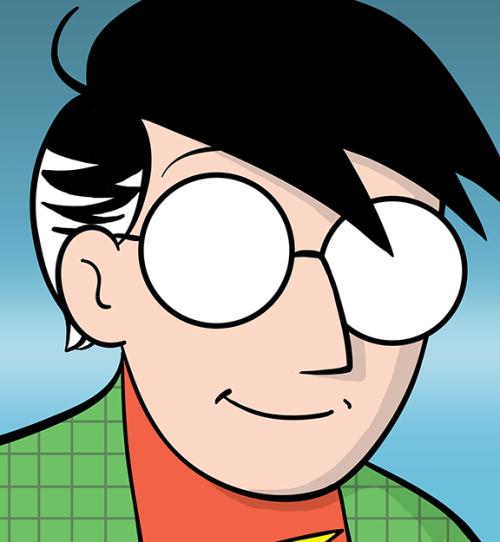Artist Scott McCloud: Art so HARD!
The “Aristotle of comics” visited St. Paul last Sunday.

February 25, 2015
Rain Taxi Review, a local nonprofit literary organization, hosted comic guru Scott McCloud at Macalester College last Sunday. Fifteen minutes before the auditorium doors were opened to the public, a long line had formed, both filling up and spilling out of the foyer. Among the 200 or so fans who came to listen to the legendary storyteller discuss his newest book, “The Sculptor,” were local poet Kate Kysar and National Book Award winner William Alexander.
Moderator and editor of Rain Taxi Review Eric Lorberer introduced McCloud, highlighting moments which exemplify McCloud’s storied history in comics, starting with the retro futurist “Zot!,” his series on comic-book theory, “Making Comics,” “Understanding Comics” and “Reinventing Comics,” as well as noting McCloud’s innovations in comic technology and the twenty-four hour comic. Lorberer concluded his introduction by saying, “In all his work, and this latest work of fiction is no exception, Scott McCloud reveals not only his technical mastery of the medium and deep knowledge of its history, but a relentless and infectious optimism about its future and belief in its potential.” McCloud is also known for his TED Talk on understanding visual arts and online tutorials.
Scott McCloud is graying at the temples, his eyes twinkle behind a more rectangular version of the glasses his iconic self-portrait sports, and he has an easy and amiable way of discussing his work. Many McCloud reviewers and fans lamented the five-year break between his previous publication and “The Sculptor” (twenty-years since his last work of fiction!), but all agree that the new tome, at 496 pages, has been worth the wait. Neil Gaiman, the reclusive and internationally admired author—whose comic “Sandman” is something of an underground classic—has been quoted as saying that McCloud’s “The Sculptor” is “The best graphic novel I’ve read in years. It’s about art and love and why we keep on trying. It will break your heart.” Lorberer agreed.
“The Sculptor” is about David Smith, a young artist who had a brief flurry of success as a youth, but is now unknown. David makes a deal with the devil: he has two hundred days to live, but during that time he will have the power to sculpt whatever he wants with his bare hands.
“It came to me when I was pretty young,” said McCloud. “It sounds like something you would come up with when you were twenty-two, and it is.” But he worked on it quietly, reluctantly, for decades, bringing to the vitality of his vigorously youthful plot the objectivity and wisdom of middle-age. He admitted that he’d always really liked the story and finally decided to go for it.
In just one captivating hour, much of McCloud’s talents were showcased; for instance, his attention to detail in a single frame, his humor, his mastery of storytelling through the comic medium, using setting as a character, and attention to theme. “What I discovered,” McCloud said, “was that this story was all in the details.” McCloud recounted how he would take business trips to New York during the five years that he worked on “The Sculptor,” which he and his wife lovingly referred to as “that fucking book.” He mentioned a BBQ place in Chelsea that had a corner booth with big plate-glass windows. He put a camera down on the corner there—“I could probably be arrested for this, I shouldn’t admit it”—and took somewhere around a thousand photos of that area. “Just click-click-click-click as people walked by. Picture after picture after picture of people,” said McCloud. “I wanted the pedestrians in Chelsea to look different from the pedestrians in midtown who are different from the pedestrians in Brooklyn.”
Standing on stage, McCloud’s glasses lenses reflected blue from the projected images of his comic as he showcased fundamental components of his creation, theme, the use of the foreground and background, his process for layering frames, words and text bubbles. While Manhattan streetlights, skylines, parks and street traffic flashed on the big white screen behind him, he explained, “I really think of New York as the fourth main character in the book. There’s landscape, the construction of the city in terms of architecture, those little things you see walking through the city, but then there’s the human landscape too…characters in the background have their own life here.” It would be hard to argue that he did not achieve these desired effects.
Looking at the frames where David first uses his sculpting “super power” as awarded him by the devil, David works on a piece of granite with his bare hands. In the frame, David pushes hard into the granite and the effect leaves the square piece of dense rock in a state that looks like a giant splash of water which has been frozen solid at peak force, complete with orb like molecules of ‘water’ suspended up from a thin circling crest of gray stone. McCloud put a finger to his chin, stared at this image, and jovially mentioned, “I was at the Chicago humanities festival a couple of days ago, and my moderator said that he [David] had the superpower to ‘Art, so HARD!’”
William Alexander reviewed McCloud’s “Making Comics” in 2006-2007 for Rain Taxi Review. Said Alexander, “Scott’s books are both an instruction and the thing itself. Anyone who wants to tell stories, to have visual information work in any way—indeed, everyone—should read his three books about comics… I’m constantly recommending them to students and friends who aren’t comic makers. Novelists even will understand narrative by reading those books in a way that no other source will communicate.”
To describe the whole evening would spoil the magic palpable to those who braved the blistery February temperatures in order to attend. And perhaps, allow William Alexander to have the last word:
“I think Scott [McCloud] understands the medium he works in better than anyone else I know. There’s just a sense of awesome… For example, there’s a different kind of understanding that comes from watching a film where the director understands movies down to the minutiae of their DNA, and is simultaneously telling a good story with some film on a really big screen, but also understanding what that means and everything that it ever meant. I don’t know that Scott [McCloud] understands everything comics ever meant, but I think he’s a lot closer than anyone else I can think of.”





